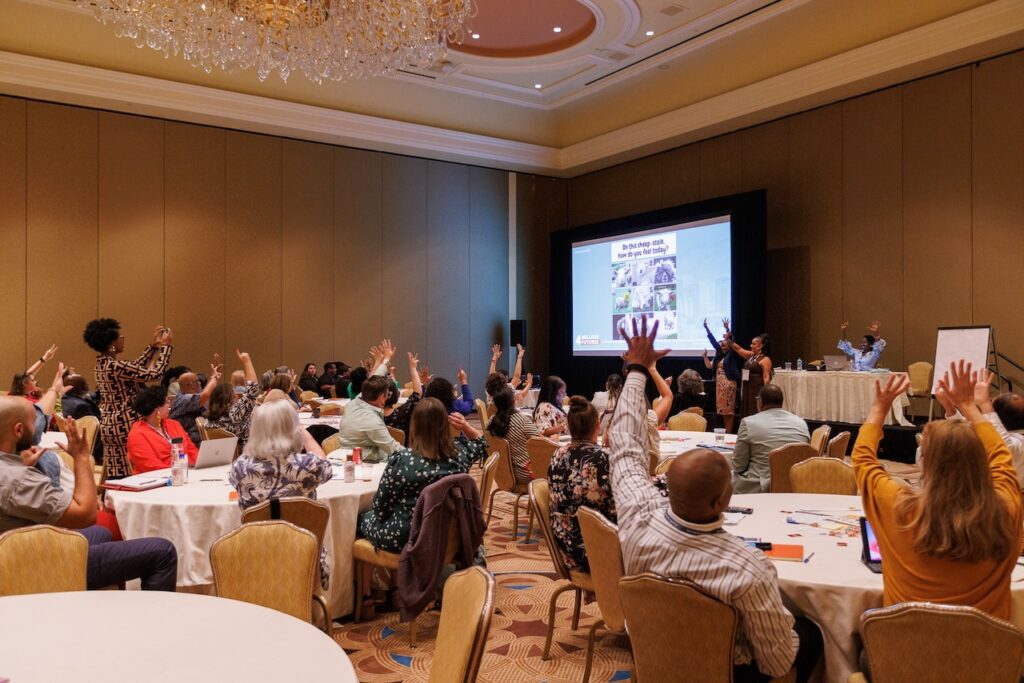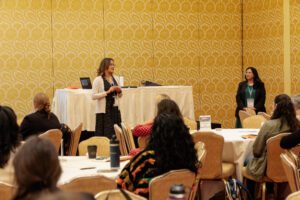At the 2024 Cradle to Career Network Convening, leaders from across the Cradle to Career Network shared valuable lessons about the power of data, community collaboration and sustained partnerships. These insights reflect the collective knowledge of communities working together to create lasting change for young people, from cradle to career. Here are five key takeaways:
1. Building Trust to Institutionalize Change
From influencing city policy to embedding community voices in decision-making processes, network members emphasized the power of trust in achieving sustainable, systemic change. Boston Opportunity Agenda shared how community-driven research and data collection efforts led to the establishment of the Office of Early Childhood in their city. By maintaining strong, trusted relationships with government stakeholders, community-driven insights were institutionalized, showing that long-term, meaningful change is possible when decision-makers actively engage with and listen to the community.


2. Setting Clear Targets for Aligned Collaboration
Rocky Mountain Partnership demonstrated how aligning community partners toward a common goal can accelerate progress. Setting their ambitious target — advancing 71,000 young people toward economic mobility, in line with StriveTogether’s 4 million futures plan — required not only cross-sector collaboration but also a shift in mindset among partners, who had to see their individual contributions as part of broader work to improve cradle-to-career outcomes. As Executive Director Lisandra Gonzales noted, “You can’t improve what you can’t measure.” This data-driven approach has not only galvanized local partners into action, but additionally served to garner additional interest from funders.
3. Leveraging Philanthropy to Catalyze Innovation
Philanthropy can be a powerful driver of innovation when paired with the knowledge and expertise that lives in communities. This collaboration requires intentional relationship-building and a clear vision for how initiatives contribute to systemic change, which Cradle to Career Network members are well-equipped to cultivate. E3 Alliance shared their journey with RAISEup Texas, an initiative aimed at improving middle school education through personalized learning and tiered interventions. Their work began with a small demonstration model and scaled across Texas through deep relationships with funders. This success story highlights the importance of aligning with funders, demonstrating clear impact and developing sustainable models to support long-term growth. 
4. Ensuring Data Responsibility Though Intention and Accountability
Network members underscored the importance of not just using data, but using it responsibly. The team from Baltimore’s Promise shared their approach to ensuring ethical data use in the Baltimore City Youth Data Hub. Their data work centers communities, acknowledging the potential for harm when data is misused or misunderstood. Throughout the Convening, there was a clear call to involve community voices in decisions around data collection and application.
5. Navigating Complexities to Achieve Systemic Change
Systemic change is complex, and network members recognized the challenges of scaling successful pilots into larger, sustained initiatives. Chattanooga 2.0 shared their experience in expanding literacy support models from small pilots to a district-wide effort. Their approach involved strategic risk-taking, data-informed decision making, and a deep understanding of community power dynamics. By carefully mapping out where influence was held, they were able to engage decision-makers and secure the buy-in needed to scale their work effectively.
The 2024 Cradle to Career Network Convening showcased the collective wisdom and resilience of place-based partnerships striving to create better outcomes for youth and families. From leveraging data to fostering cross-sector collaboration and philanthropy, these insights offer powerful examples of what’s possible when communities unite around shared goals. As network members continue to advance their work, these lessons serve as a reminder that transforming systems is a journey — one that requires intention, trust and a commitment to impact.






